I have a custom control to show items with checkboxes inside a ComboBox. To realize this, I used a DataTemplate with a CheckBox. The ItemSource of the ComboBox uses a binding to a ObserableCollection<FilterValue> which contains my filter values. FilterValue is a custom class implementing INotifyPropertyChanged. The properties Content and IsChecked of the CheckBox use bindings as well to use the values of my list. This control will be used in Silverlight.
Binding itself works fine, as seen here:

The problem appears when I register the Checked or Unchecked event.
As soon as one of the check boxes changed its state, the event is fired as expected but at this moment, the value in the bound list is still not updated.
What I saw while debugging is that the Checked/Unchecked events are firing before the PropertyChanged event of the FilterValue.
This means that at the time the event is firing, I can't ask the list for all active (checked) filters. What could I do to achieve this?
FilterControl.xaml:
<UserControl
xmlns="http://schemas.microsoft.com/winfx/2006/xaml/presentation"
xmlns:x="http://schemas.microsoft.com/winfx/2006/xaml"
xmlns:d="http://schemas.microsoft.com/expression/blend/2008"
xmlns:mc="http://schemas.openxmlformats.org/markup-compatibility/2006"
xmlns:sdk="http://schemas.microsoft.com/winfx/2006/xaml/presentation/sdk"
xmlns:local="clr-namespace:Controls" x:Class="Controls.FilterControl"
mc:Ignorable="d"
d:DesignHeight="45" d:DesignWidth="140">
<StackPanel x:Name="LayoutRoot">
<sdk:Label x:Name="LblFilterDescription" Content="-" />
<ComboBox x:Name="Filter" Width="120" ItemsSource="{Binding AvailableFilters, RelativeSource={RelativeSource FindAncestor, AncestorType=local:FilterControl}}">
<ComboBox.ItemTemplate>
<DataTemplate>
<CheckBox Content="{Binding Path=Text}" IsChecked="{Binding Path=IsChecked, Mode=TwoWay, UpdateSourceTrigger=PropertyChanged}" Checked="FilterChanged" Unchecked="FilterChanged" />
</DataTemplate>
</ComboBox.ItemTemplate>
</ComboBox>
</StackPanel>
</UserControl>
FilterControl.xaml.cs:
public partial class FilterControl : UserControl
{
public delegate void FilterChangedHandler(object sender);
public event FilterChangedHandler OnFilterChanged;
public ObservableCollection<FilterValue> AvailableFilters { get; set; }
public List<string> AppliedFilters
{
get
{
return new List<string>(AvailableFilters.Where(filter => filter.IsChecked).Select(filter => filter.Text));
}
}
public FilterControl()
{
InitializeComponent();
AvailableFilters = new ObservableCollection<FilterValue>();
}
public bool AddFilterValue(string filterValue)
{
bool found = false;
foreach (FilterValue f in AvailableFilters)
{
if (f.Text == filterValue)
{
found = true;
break;
}
}
if (!found)
AvailableFilters.Add(new FilterValue() { IsChecked = false, Text = filterValue });
return found;
}
private void FilterChanged(object sender, RoutedEventArgs e)
{
//Here if I check AvailableFilters, the value is not changed yet.
//PropertyChanged allways fires after this, what makes me unable to
//get all currently applied filters (checked items)...
}
}
FilterValue:
public class FilterValue : INotifyPropertyChanged
{
private bool _IsChecked;
private string _Text;
public bool IsChecked
{
get { return _IsChecked; }
set
{
_IsChecked = value;
PropertyChanged?.Invoke(this, new PropertyChangedEventArgs("IsChecked"));
}
}
public string Text
{
get { return _Text; }
set
{
_Text = value;
PropertyChanged?.Invoke(this, new PropertyChangedEventArgs("Text"));
}
}
public event PropertyChangedEventHandler PropertyChanged;
}